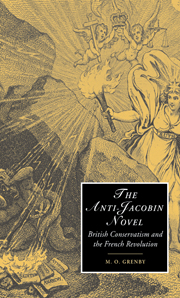Book contents
- Frontmatter
- Contents
- Preface
- Acknowledgements
- Introduction
- 1 Novels reproved and reprieved
- 2 Representing revolution
- 3 The new philosophy
- 4 The vaurien and the hierarchy of Jacobinism
- 5 Levellers, nabobs and the manners of the great: the novel's defence of hierarchy
- 6 The creation of orthodoxy: constructing the anti-Jacobin novel
- 7 Conclusion
- Notes
- Select bibliography
- Index
1 - Novels reproved and reprieved
Published online by Cambridge University Press: 22 September 2009
- Frontmatter
- Contents
- Preface
- Acknowledgements
- Introduction
- 1 Novels reproved and reprieved
- 2 Representing revolution
- 3 The new philosophy
- 4 The vaurien and the hierarchy of Jacobinism
- 5 Levellers, nabobs and the manners of the great: the novel's defence of hierarchy
- 6 The creation of orthodoxy: constructing the anti-Jacobin novel
- 7 Conclusion
- Notes
- Select bibliography
- Index
Summary
It was said by Fletcher of Saltoun, ‘Let me make the ballads of a nation, and I care not who makes the laws.’ Might it not be said with as much propriety, Let me make the novels of a country, and let who will make the system?
Anna Lætitia Barbauld, An Essay on the Origin and Progress of Novel Writing (1810)A rhetoric of opposition to the spread of reading, and to the educational and distributive processes that seemed to facilitate it, grew steadily throughout the eighteenth century. This was generally a rather petulant and sporadic resentment against the trickle down of a literary competence, but it occasionally found a tighter focus. Institutions which could be painted as inventions only of the present iniquitous age were seized upon as simultaneously causes and symptoms of the problem. Chief amongst these were the circulating library, the Sunday or charity school, and the novel. In the conservative imagination, the Sunday school taught the illiterate to read; the circulating library enabled them to do so affordbly; and the novel enticed into the habit those who previously been unwilling. What these institutions have in common is that they could all be arraigned for spreading the reading habit to new sections of society, to the lower orders, to women, to children. It was the spread of literature to these inexperienced and susceptible readers which was to be condemned, conservative commentators were careful to point out, not reading itself, which few Protestants, few believers in the past glories of English literature, and few who read themselves, would be prepared to do.
- Type
- Chapter
- Information
- The Anti-Jacobin NovelBritish Conservatism and the French Revolution, pp. 13 - 27Publisher: Cambridge University PressPrint publication year: 2001

